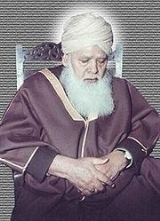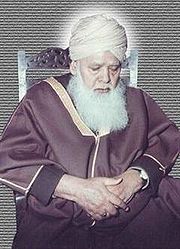
Sayyed Ahmad Saeed Kazmi
Encyclopedia

Multan
Multan , is a city in the Punjab Province of Pakistan and capital of Multan District. It is located in the southern part of the province on the east bank of the Chenab River, more or less in the geographic centre of the country and about from Islamabad, from Lahore and from Karachi...
. He is known for his contribution to the Pakistan Movement
Pakistan Movement
The Pakistan Movement or Tehrik-e-Pakistan refers to the historical movement to have an independent Muslim state named Pakistan created from the separation of the north-western region of the Indian subcontinent, partitioned within or outside the British Indian Empire. It had its origins in the...
, Urdu
Urdu
Urdu is a register of the Hindustani language that is identified with Muslims in South Asia. It belongs to the Indo-European family. Urdu is the national language and lingua franca of Pakistan. It is also widely spoken in some regions of India, where it is one of the 22 scheduled languages and an...
translation and explanation (Tafseer) of Quran, and Dars-e-Hadith
Hadith
The term Hadīth is used to denote a saying or an act or tacit approval or criticism ascribed either validly or invalidly to the Islamic prophet Muhammad....
.
Birth and family
Ahmed Saeed Kazmi was born at Mohalla Katkoi, AmrohaAmroha
Amroha is a small town in the north-western Uttar Pradesh state in northern India. It is located north-west of Moradabad, near the Sot River...
(India
India
India , officially the Republic of India , is a country in South Asia. It is the seventh-largest country by geographical area, the second-most populous country with over 1.2 billion people, and the most populous democracy in the world...
) on Thursday, 13 March 1913 (04 Rabi-us-Sani 1331 Hijri
Islamic calendar
The Hijri calendar , also known as the Muslim calendar or Islamic calendar , is a lunar calendar consisting of 12 lunar months in a year of 354 or 355 days. It is used to date events in many Muslim countries , and used by Muslims everywhere to determine the proper day on which to celebrate Islamic...
). His father Syed Muhammad Mukhtar Ahmad Shah Kazmi died when Ahmed Saeed was still an infant. The family relates with Imam Musa Kazim through 35 steps, and this is why he is called Kazmi.
Education
Ahmad Saeed Kazmi was only six years old when his father died at the age of 39. Therefore his eldest brother Muhammad Khalil Kazmi brought him up. Because all of his family members were highly educated, he got his basic education from his mother. Later on his uncle gave him Sanad-e-Hadith and Sufist education. He became renowned of his knowledge at a very early age.Migration to Multan
Sayyed Nafir Alam’s was a Sufi saint, he used to celebrate the ursUrs
Urs is the death anniversary of a Sufi saint in South Asia, usually held at the saint's dargah . South Asian Sufis being mainly Chishtiyya, refer to their saints as lovers and God as beloved...
of Khawja Moin-ud-Din Chishti Ajmeri
Moinuddin Chishti
Sultan-ul-Hind, Moinuddin Chishti was born in 1141 and died in 1230 CE. Also known as Gharīb Nawāz "Benefactor of the Poor" , he is the most famous Sufi saint of the Chishti Order of the Indian Subcontinent. He introduced and established the order in South Asia...
in Multan
Multan
Multan , is a city in the Punjab Province of Pakistan and capital of Multan District. It is located in the southern part of the province on the east bank of the Chenab River, more or less in the geographic centre of the country and about from Islamabad, from Lahore and from Karachi...
. He invited young Ahmad Saeed to debate in Multan
Multan
Multan , is a city in the Punjab Province of Pakistan and capital of Multan District. It is located in the southern part of the province on the east bank of the Chenab River, more or less in the geographic centre of the country and about from Islamabad, from Lahore and from Karachi...
. When he listened to his speech, he was greatly impressed. So he continuously requested Ahmad Saeed to permanently shift to Multan. Therefore Kazmi migrated to Multan in the early 1935.
In Multan, Kazmi started teaching in his own home near Tinan Wali Khoi. In November 1935 he started giving lectures in Masjid Hafiz Fateh Sher Outside Lohari Gate, which continued for 18 years. After that He started Dars-e-Hadith in Hazrat Chup Shah’s Mosque and completed Mishkat Sharif
Mishkat al-Masabih
Mishkat al-Masabih is an expanded version of by Al-Baghawi's Masabih al-Sunnah by Muḥammad ibn ʻAbd Allāh Khatib Al-Tabrizi. Khatib Al-Tabrizi d. 741H rendered this version of the original text more accessible to those not having an advanced knowledge of the science of hadith...
followed by Bukhari Sharif
Sahih Bukhari
Ṣaḥīḥ al-Bukhārī , as it is commonly referred to, is one of the six canonical hadith collections of Islam. These prophetic traditions, or hadith, were collected by the Persian Muslim scholar Muhammad ibn Ismail al-Bukhari, after being transmitted orally for generations. Muslims view this as one of...
. Here he soon became famous due to his knowledge.
In that era, Muslims of India were demanding independence and their major party was Muslim League. Ahmad Saeed was impressed by the Muslim League’s program therefore he joined. In the area of Southern Punjab
Multan
Multan , is a city in the Punjab Province of Pakistan and capital of Multan District. It is located in the southern part of the province on the east bank of the Chenab River, more or less in the geographic centre of the country and about from Islamabad, from Lahore and from Karachi...
, he worked to spread political awareness among Muslims and to bring them to the platform of Muslim League. He never met with Muhammad Ali Jinnah
Muhammad Ali Jinnah
Muhammad Ali Jinnah was a Muslim lawyer, politician, statesman and the founder of Pakistan. He is popularly and officially known in Pakistan as Quaid-e-Azam and Baba-e-Qaum ....
, yet he was connected with him through mail.
He was the either the founder of most Muslim organizations or was the part of themm, such as Jama'at e Ahlesunnat, Jamiat Ulema-e-Pakistan
Jamiat Ulema-e-Pakistan
The Jamiat Ulema-e-Pakistan is a political party in Pakistan. It is part of the Islamic Muttahida Majlis-e-Amal, that won at the last legislative elections, 20 October 2002, 11.3 of the popular vote and 53 out of 272 elected members.This party belongs to the Sunni current, which in...
, and Dawat e Islami.
On the request of nawab of Bahawalpur and nawab of Kalabagh Hazoor Ghazali e zaman accepted the post of Shaikh ul Hadith in Islamia university of Bahawalpur, and he taught there for long time.
Marriage and Offspring
Kazmi married into a noble family in 1934 at the age of 21, but his wife died after nine years. In these nine years, she gave birth to four daughters, three of them died in infancy while the fourth one(namely Naseem Akhter) married with his nephew Zia-ul-Matin Kazmi; she also gave birth to four daughters(namely Sualiha, Sajida, Abida and Fatima) and died in 1962. His second wife also practiced to Sufism and was a mureedMureed
Mureed is a village and union council, an administrative subdivision, of Chakwal District in the Punjab Province of Pakistan, it is part of Chakwal Tehsil....
of Khalil Ahmad Kazmi. His son Hamid Saeed Kazmi
Hamid Saeed Kazmi
Hamid Saeed Kazmi was the Pakistani federal Minister for Religious Affairs, belonging to the Pakistan Peoples Party under the cabinet of Prime Minister Yousaf Raza Gillani. Kazmi was born in a well-to-do religious family; his father, Ahmad Saeed Kazmi, was a prominent Sufi and Islamic scholar. He...
served as a federal Minister for Religious Affairs.
See also
- Mustafa Raza KhanMustafa Raza KhanMustafa Raza Khan, commonly known among the Muslims of South Asia as Mufti e Azam e Hind, was born in Bareilly, Uttar Pradesh, India in 1892. His father, Ahmed Raza Khan was the founder of the Barelvi school of Sunni Islam in South Asia.. His grandfather, Moulana Naqi Ali Khan Mustafa Raza Khan,...
- Akhtar RazaAkhtar RazaAkhtar Raza is an Islamic jurist, and currently Grand Mufti of India. Mufti Akhtar Raza was born on 23 November 1943 , in the district of Saudagran in the city of Bareilly, India. The name given during his Aqeeqah was Muhammad. He was also given the name Muhammad Ismail Raza...
- Hamid Raza KhanHamid Raza KhanHamid Raza Khan Qaadiri: was an Islamic scholar and mystic of the Barelvi movement. Qaaderi was born in 1875 , in the city of Bareilly, India...
- Muftī Justice Sayyid Shujaat 'Alī Qadri
- Shaykh Ul Islam Muhammad Tahir Ul Qadri
- Abu Bilal Muhammad Ilyas Attar Qadri
- Ahle Sunnat Wal Jamaat
- Qari Muslehuddin SiddiquiAllama Al-Hafiz Al-Qari Muhammad Muslehuddin Siddiqui Qadri RazaviMuhammad Muslehuddin Siddiqui , was a Sufi leader of Hyderabad. He was born on the 11th day of Rabi' al-awwal 1336AH, corresponding to 27 December 1918, at the time of true dawn in Nander, Hyderabad deccan. His father was Ghulam Jilani, an Islamic scholar...
External links
- Audio Files
- Mausoleum Image
- Books by Kazmi at Kazmis.com

